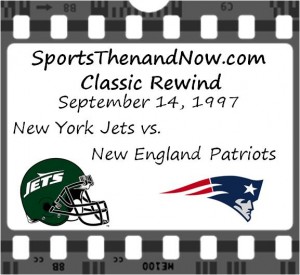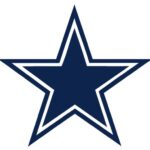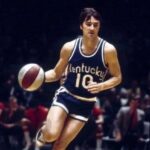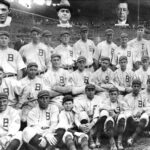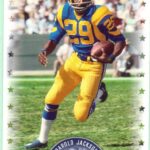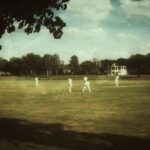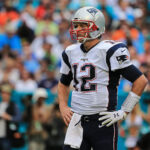Classic Rewind: Patriots Spoil The Return of the Tuna
In week 3 of the 1997 NFL season, the New York Jets traveled to Foxboro to face the defending AFC champion New England Patriots in a primetime Sunday night match-up.
This was perhaps the most anticipated game of the early season as Jets head coach Bill Parcells returned to Foxboro for the first time since he left the Patriots following their run to Super Bowl XXXI.
In the two weeks between the Patriots’ win in the AFC Championship Game and the Super Bowl, speculation ran wild that Parcells would leave the Patriots because he was unhappy that he did not have more say on personnel matters.
Five days after losing to the Packers 35-21 in Super Bowl XXXI, Parcells resigned as head coach of the Patriots after four seasons.
In his press conference, Parcells famously said “If they want you to cook the dinner, at least they ought to let you shop for some of the groceries”.
Parcells would then go on to become head coach of the New York Jets, replacing Rich Kotite who had complied a 4-28 record in two seasons, including a 1-15 record in 1996.
The Jets had actually been 4-32 ever since the infamous “Fake Spike” game where Dolphins quarterback Dan Marino faked that he was going to spike the ball and then threw a game-winning touchdown pass to hand the Jets a 28-24 defeat in a game was first place for the AFC East.
The coach for the Jets in that game was Pete Carroll, who was fired after the 1994 season, and then became Parcells’ successor in New England.
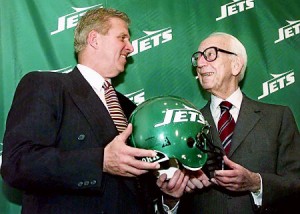
Bill Parcells made the first meeting of 1997 between the Patriots and Jets a big one when he switched teams in the off-season.
The much anticipated game in Foxboro was billed as the “Tuna Bowl” since Parcells was nicknamed the “Big Tuna”.
The game got off to an electrifying start when Patriots rookie Chris Canty returned the opening kickoff 63 yards to the Jets’ 30-yard-line, leading to a 32-yard touchdown pass from quarterback Drew Bledsoe to tight end Ben Coates to give New England a 7-0 lead just two minutes into the game.
The Patriots were forced to punt after their next offensive possession, but they never got the punt off as punter Tom Tupa had a punt blocked for the first time in his career after 223 attempts.
The punt was blocked by Corwin Brown, giving the Jets possession at the Patriots’ 43-yard-line, setting up a touchdown drive that ended with a 2-yard touchdown run by quarterback Neil O’ Donnell that tied the game at 7-7.
The Patriots responded with a 65-yard drive that culminated with a 2-yard touchdown run by Curtis Martin that put New England back ahead 14-7 after the first quarter.
In the second quarter, Jets kicker John Hall kicked a 26-yard field goal that cut the Patriots’ lead to 14-10, but in the final minutes of the first half, New York lost a golden opportunity to take the lead.
With 24 seconds left, the Jets were at the Patriots’ six-yard-line with a first-and-goal.
That is where O’ Donnell completed a pass to fullback Richie Anderson, who made it to the 1, only to be hit by Patriots linebacker Todd Collins, forcing a fumble that was recovered by the Patriots, which preserved their 14-10 lead at halftime.
The Jets did take the lead in the third quarter when linebacker Mo Lewis intercepted a Bledsoe pass and returned it 43 yards for a touchdown that gave the Jets their first lead of the game at 17-14.
Following the interception, the Patriots traveled to the Jets’ four-yard-line where they blew an opportunity to take the lead as Coates drew an offensive pass interference penalty in the end zone and Bledsoe was called for a 15-yard unsportsmanlike conduct penalty after he hit Jets strong safety Victor Green in the face.
New England had to settle for a 33-yard field goal by Adam Vinatieri that tied the game at 17.
The score was still 17-17 at the 4:35 mark of the fourth quarter when O’ Donnell was sacked by Patriots linebacker Ted Johnson, forcing a fumble that was recovered by linebacker Willie McGinest at the Patriots’ 47-yard-line.
This lead to a 10-yard touchdown pass from Bledsoe to backup tight end Lovett Purnell, who entered the game after Coates left because of a rib injury, with 2:07 to play in regulation.
Martin was the driving force on the touchdown drive as he gained 31 of the 53 yards on the drive as the Patriots took a 24-17 lead.
The Jets got the ball back at their own 18-yard-line where it took New York almost a minute and a half to get into the end zone, a 24-yard touchdown pass from O’ Donnell to Keyshawn Johnson that with the extra point tied the game at 24-24 with 31 seconds to play in regulation.
It seemed apparent that the game was headed for overtime but Derrick Cullors fumbled the ensuing kickoff, which was recovered by Jets linebacker Chad Cascadden, setting up a potential game-winning field goal with 20 seconds left in the game.
Hall came on to attempt a 29-yard field goal that would give Parcells a victory in his first trip to Foxboro.
But the kick was blocked by linebacker Mike Jones and the game went into overtime tied at 24.
In the overtime period, the Patriots were able to put together a nine-play, 62-yard drive, with Martin carrying it seven times for 49 yards on the drive, putting New England on the doorstep of victory as Vinatieri came on to attempt to a 34-yard field goal.
Vinatieri’s kick sailed through the uprights and after eight minutes and three seconds of overtime, the Patriots came away with a 27-24 victory.
The Patriots would finish the season with a 10-6 record, winning the AFC East for the second year in a row, and defeating the Miami Dolphins in the wild card round of the playoffs, before being eliminated by the Pittsburgh Steelers in the divisional round.
Despite the tough loss, Parcells would direct the Jets on one of the greatest turnarounds in NFL history as New York finished with a 9-7 record, an eight-game improvement from the previous season and just missing the playoffs.
The next season, the Jets would win the AFC East with a 12-4 record and advance to the AFC Championship Game where they would fall to the Denver Broncos.
Parcells would coach the Jets one more season, an 8-8 record in 1999, before temporarily retiring as head coach. He returned to the NFL in 2003 as head coach of the Dallas Cowboys, where he coached four more seasons and compiled a 34-30 record before retiring for good in 2006.
